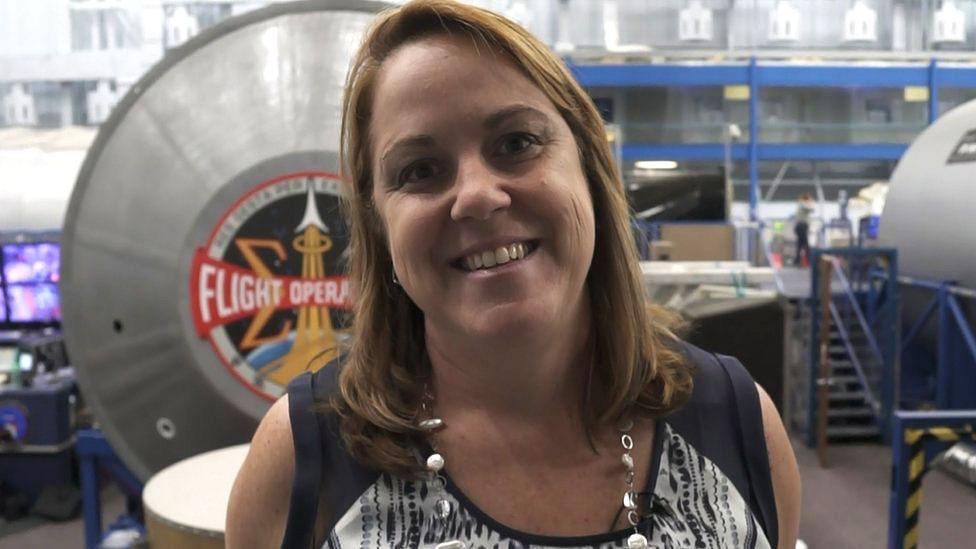One small step for man, but women still have to leap
- Published
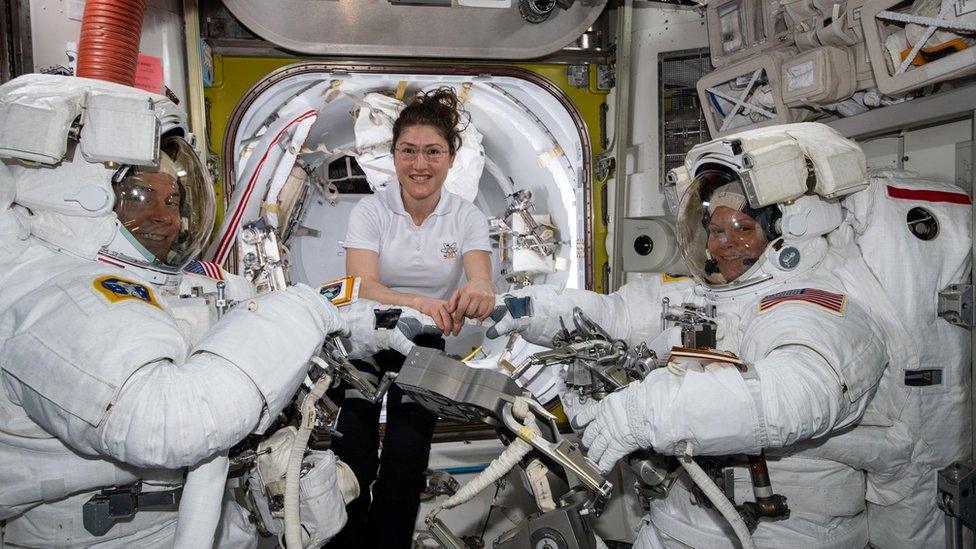
Nasa cancelled the first all-female spacewalk because there were not enough suits in the right size
Nasa has cancelled plans for its first all-female spacewalk this Friday, citing a lack of available spacesuits in the right size.
There are not enough suits configured on the International Space Station for both Christina Koch and Anne McClain to go out at the same time, so male astronaut Nick Hague will replace Lt Col McClain.
Last week, Lt Col McClain went on a spacewalk with Col Hague and learned that a medium-sized spacesuit fitted her best.
However, Nasa said in a statement: "Because only one medium-size torso can be made ready by Friday 29 March, Koch will wear it."
For many women working in science, a choice between using equipment designed for men or missing out altogether is all too familiar.
Allow X content?
This article contains content provided by X. We ask for your permission before anything is loaded, as they may be using cookies and other technologies. You may want to read X’s cookie policy, external and privacy policy, external before accepting. To view this content choose ‘accept and continue’.

Jessica Mounts is a biologist. For more than a decade she worked in freshwater fisheries science for the Kansas Department of Wildlife, Parks and Tourism. She is now the executive director of the Kansas Alliance for Wetlands and Streams.
She noted Nasa's missed milestone with disappointment, but she was not necessarily surprised.
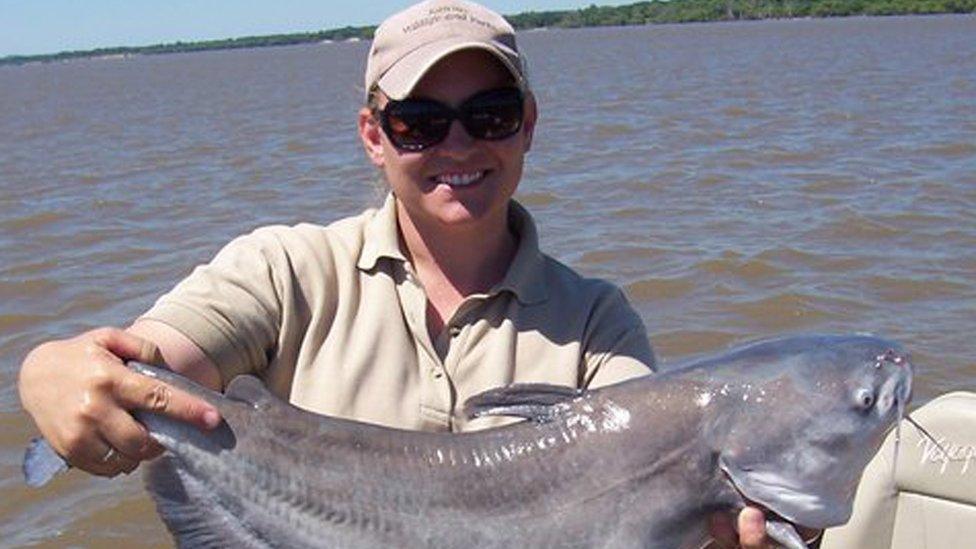
Jessica Mounts works in fisheries science
"Representation matters everywhere," she told the BBC.
"The first female spacewalk was both historically significant and inspiring to young girls, like my 10-year-old niece, who dreams of eventually going to space.
"If we can't provide women the equipment they need to do their jobs as astronauts, scientists or first responders, how can we expect to make progress towards equal representation?
"How can women represent a full range of career choices to the next generation of young girls, when we're held back by something as simple as equipment and clothing that fits?"
Pink trim
Jessica's work means she is frequently in rivers or lakes, in all weathers, to monitor and evaluate fish populations. She has often been, she says, "the only woman on the boat".
"Most of the equipment I've used has been designed for men. The problems caused aren't simply an annoyance - they all go back to personal safety.
"Clothing that is too loose gets caught in moving equipment. Boots that are too big mean tripping and falling.
"The alternatives that are 'designed for women' are frequently more expensive, have smaller pockets, are still ill-fitting and most likely have just been copies of the male version with a little pink added to the trim."
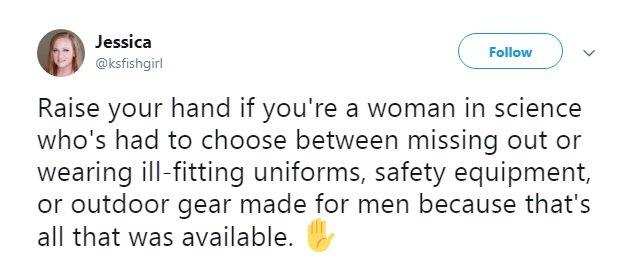

Jessica shared her frustrations on Twitter and she was far from alone in her experiences.
There was the biostatistician with a PhD in quantitative genetics, who could not find safety goggles that fit properly when working in the lab with chemicals.
Jessica was also tweeted by a biologist who could not get the steel toe-capped boots she needed for field work outside, and a neuroscientist who said she "passed out from overheating" because the only surgical gowns available for teaching were in "six-foot tall man" sizes and had to be wrapped around her three times.
And it is not only the scientific world where women must frequently make do. Caroline Criado Perez is a feminist, journalist and author of Invisible Women: Exposing Data Bias in a World Designed for Men.
"We don't collect data on women and therefore we don't design things for women," she told the BBC's Jeremy Vine show on Wednesday.
"We think of male bodies and typical male life patterns as the default for humans overall, and so women are disadvantaged as a result.
"Spacesuits are the tip of the iceberg. When you look at personal protective equipment - stab vests, safety goggles, safety boots, all those kinds of clothes and tools that people are supposed to use to protect themselves at work, a lot of the time they don't fit women."
You might also be interested in:
Jessica says things are improving, but the pace of change is slow.
"As more women enter the field, things have improved marginally.
"Waders made in women's sizes are now available and there are some designs of personal flotation devices made to accommodate breasts. That said, we have a long way to go.
"Historically, science and similar fields have been dominated by men and the systemic culture of our society continues to support that narrative.
"When only men are allowed to work, the only equipment available is made for them. When women want to work, the equipment isn't there and is a tangible symbol of the greater issue of systemic sexism in a society designed, in general, by and for men."
- Published26 March 2019
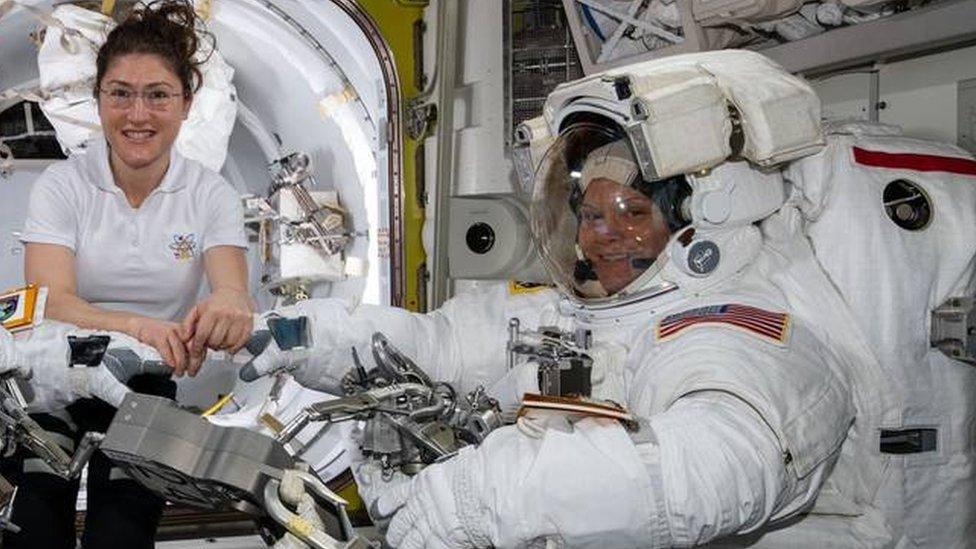
- Published17 April 2018
